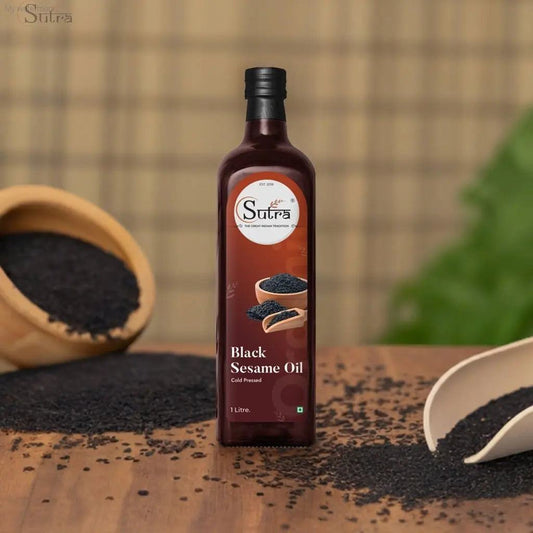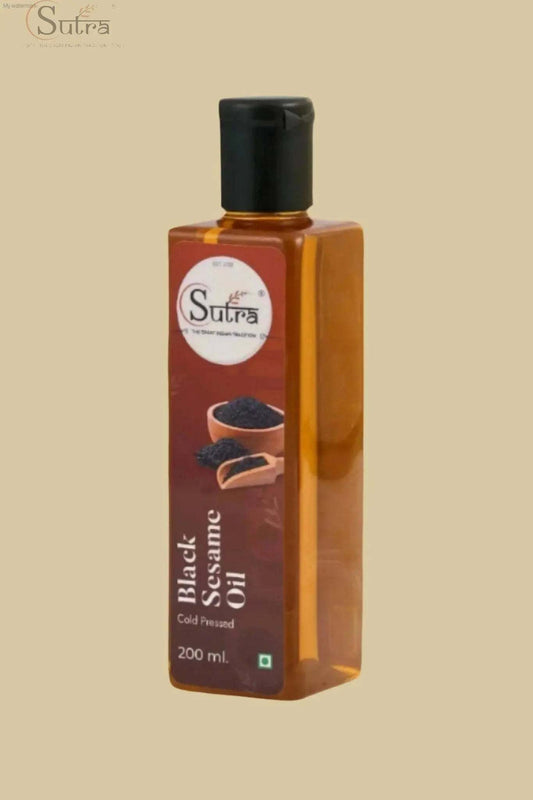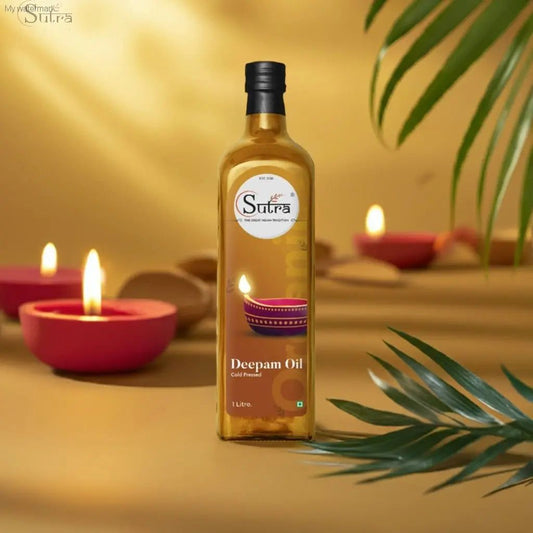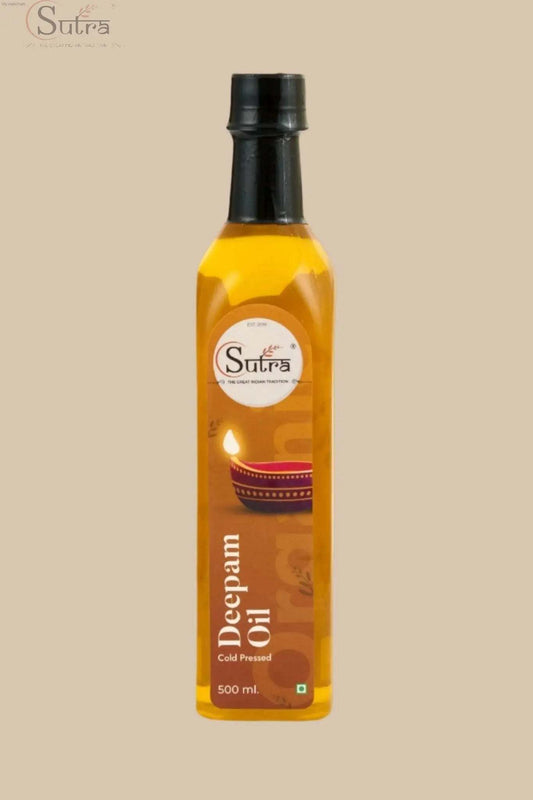Naturally Extracted Wooden Stone Pressed Oils
-
Cold Pressed Gingelly Oil (Black Sesame Seed Oil) – Ayurvedic Til Oil
Vendor:Ecovale India Private LimitedRegular price From Rs. 173.00Regular priceUnit price perRs. 216.00Sale price From Rs. 173.00Sale -
Pancha Deepam Oil / Traditional Lamp Oil – For Auspicious Lighting & Positive Energy
Vendor:Ecovale India Private LimitedRegular price From Rs. 135.00Regular priceUnit price perRs. 135.00Sale price From Rs. 135.00
Naturally Extracted Wooden Stone Pressed Oils
Traditional Ghani Cold Pressed Oils – What Makes Them Better?
Wooden stone pressed oils are extracted using a traditional wooden ghani setup, which uses a slow rotational motion to press seeds without generating heat. This preserves essential nutrients, antioxidants, and fatty acids naturally found in the seeds. Refined oils, in contrast, are subjected to heat and chemical treatment, stripping them of nutritional value. Wooden ghani extraction ensures the oil retains its natural flavor, aroma, and therapeutic qualities, making it ideal for cooking, skincare, and holistic health practices. This method also promotes sustainability by supporting traditional farming and village-based production units.
Wooden stone pressed oils are extracted using a traditional wooden ghani setup, which uses a slow rotational motion to press seeds without generating heat. This preserves essential nutrients, antioxidants, and fatty acids naturally found in the seeds. Refined oils, in contrast, are subjected to heat and chemical treatment, stripping them of nutritional value. Wooden ghani extraction ensures the oil retains its natural flavor, aroma, and therapeutic qualities, making it ideal for cooking, skincare, and holistic health practices. This method also promotes sustainability by supporting traditional farming and village-based production units.
Wooden stone pressed oils are extracted using a traditional wooden ghani setup, which uses a slow rotational motion to press seeds without generating heat. This preserves essential nutrients, antioxidants, and fatty acids naturally found in the seeds. Refined oils, in contrast, are subjected to heat and chemical treatment, stripping them of nutritional value. Wooden ghani extraction ensures the oil retains its natural flavor, aroma, and therapeutic qualities, making it ideal for cooking, skincare, and holistic health practices. This method also promotes sustainability by supporting traditional farming and village-based production units.
Wooden stone pressed oils are extracted using a traditional wooden ghani setup, which uses a slow rotational motion to press seeds without generating heat. This preserves essential nutrients, antioxidants, and fatty acids naturally found in the seeds. Refined oils, in contrast, are subjected to heat and chemical treatment, stripping them of nutritional value. Wooden ghani extraction ensures the oil retains its natural flavor, aroma, and therapeutic qualities, making it ideal for cooking, skincare, and holistic health practices. This method also promotes sustainability by supporting traditional farming and village-based production units.
Wooden stone pressed oils are extracted using a traditional wooden ghani setup, which uses a slow rotational motion to press seeds without generating heat. This preserves essential nutrients, antioxidants, and fatty acids naturally found in the seeds. Refined oils, in contrast, are subjected to heat and chemical treatment, stripping them of nutritional value. Wooden ghani extraction ensures the oil retains its natural flavor, aroma, and therapeutic qualities, making it ideal for cooking, skincare, and holistic health practices. This method also promotes sustainability by supporting traditional farming and village-based production units.
How Wooden Ghani Extraction Works
Wooden stone pressed oils are extracted using a traditional wooden ghani setup, which uses a slow rotational motion to press seeds without generating heat. This preserves essential nutrients, antioxidants, and fatty acids naturally found in the seeds. Refined oils, in contrast, are subjected to heat and chemical treatment, stripping them of nutritional value. Wooden ghani extraction ensures the oil retains its natural flavor, aroma, and therapeutic qualities, making it ideal for cooking, skincare, and holistic health practices. This method also promotes sustainability by supporting traditional farming and village-based production units.
Wooden stone pressed oils are extracted using a traditional wooden ghani setup, which uses a slow rotational motion to press seeds without generating heat. This preserves essential nutrients, antioxidants, and fatty acids naturally found in the seeds. Refined oils, in contrast, are subjected to heat and chemical treatment, stripping them of nutritional value. Wooden ghani extraction ensures the oil retains its natural flavor, aroma, and therapeutic qualities, making it ideal for cooking, skincare, and holistic health practices. This method also promotes sustainability by supporting traditional farming and village-based production units.
Wooden stone pressed oils are extracted using a traditional wooden ghani setup, which uses a slow rotational motion to press seeds without generating heat. This preserves essential nutrients, antioxidants, and fatty acids naturally found in the seeds. Refined oils, in contrast, are subjected to heat and chemical treatment, stripping them of nutritional value. Wooden ghani extraction ensures the oil retains its natural flavor, aroma, and therapeutic qualities, making it ideal for cooking, skincare, and holistic health practices. This method also promotes sustainability by supporting traditional farming and village-based production units.
Wooden stone pressed oils are extracted using a traditional wooden ghani setup, which uses a slow rotational motion to press seeds without generating heat. This preserves essential nutrients, antioxidants, and fatty acids naturally found in the seeds. Refined oils, in contrast, are subjected to heat and chemical treatment, stripping them of nutritional value. Wooden ghani extraction ensures the oil retains its natural flavor, aroma, and therapeutic qualities, making it ideal for cooking, skincare, and holistic health practices. This method also promotes sustainability by supporting traditional farming and village-based production units.
Wooden stone pressed oils are extracted using a traditional wooden ghani setup, which uses a slow rotational motion to press seeds without generating heat. This preserves essential nutrients, antioxidants, and fatty acids naturally found in the seeds. Refined oils, in contrast, are subjected to heat and chemical treatment, stripping them of nutritional value. Wooden ghani extraction ensures the oil retains its natural flavor, aroma, and therapeutic qualities, making it ideal for cooking, skincare, and holistic health practices. This method also promotes sustainability by supporting traditional farming and village-based production units.
Health Benefits of Cold Pressed Oils
Wooden stone pressed oils are extracted using a traditional wooden ghani setup, which uses a slow rotational motion to press seeds without generating heat. This preserves essential nutrients, antioxidants, and fatty acids naturally found in the seeds. Refined oils, in contrast, are subjected to heat and chemical treatment, stripping them of nutritional value. Wooden ghani extraction ensures the oil retains its natural flavor, aroma, and therapeutic qualities, making it ideal for cooking, skincare, and holistic health practices. This method also promotes sustainability by supporting traditional farming and village-based production units.
Wooden stone pressed oils are extracted using a traditional wooden ghani setup, which uses a slow rotational motion to press seeds without generating heat. This preserves essential nutrients, antioxidants, and fatty acids naturally found in the seeds. Refined oils, in contrast, are subjected to heat and chemical treatment, stripping them of nutritional value. Wooden ghani extraction ensures the oil retains its natural flavor, aroma, and therapeutic qualities, making it ideal for cooking, skincare, and holistic health practices. This method also promotes sustainability by supporting traditional farming and village-based production units.
Wooden stone pressed oils are extracted using a traditional wooden ghani setup, which uses a slow rotational motion to press seeds without generating heat. This preserves essential nutrients, antioxidants, and fatty acids naturally found in the seeds. Refined oils, in contrast, are subjected to heat and chemical treatment, stripping them of nutritional value. Wooden ghani extraction ensures the oil retains its natural flavor, aroma, and therapeutic qualities, making it ideal for cooking, skincare, and holistic health practices. This method also promotes sustainability by supporting traditional farming and village-based production units.
Wooden stone pressed oils are extracted using a traditional wooden ghani setup, which uses a slow rotational motion to press seeds without generating heat. This preserves essential nutrients, antioxidants, and fatty acids naturally found in the seeds. Refined oils, in contrast, are subjected to heat and chemical treatment, stripping them of nutritional value. Wooden ghani extraction ensures the oil retains its natural flavor, aroma, and therapeutic qualities, making it ideal for cooking, skincare, and holistic health practices. This method also promotes sustainability by supporting traditional farming and village-based production units.
Wooden stone pressed oils are extracted using a traditional wooden ghani setup, which uses a slow rotational motion to press seeds without generating heat. This preserves essential nutrients, antioxidants, and fatty acids naturally found in the seeds. Refined oils, in contrast, are subjected to heat and chemical treatment, stripping them of nutritional value. Wooden ghani extraction ensures the oil retains its natural flavor, aroma, and therapeutic qualities, making it ideal for cooking, skincare, and holistic health practices. This method also promotes sustainability by supporting traditional farming and village-based production units.
Nutritional Superiority Over Refined Oils
Wooden stone pressed oils are extracted using a traditional wooden ghani setup, which uses a slow rotational motion to press seeds without generating heat. This preserves essential nutrients, antioxidants, and fatty acids naturally found in the seeds. Refined oils, in contrast, are subjected to heat and chemical treatment, stripping them of nutritional value. Wooden ghani extraction ensures the oil retains its natural flavor, aroma, and therapeutic qualities, making it ideal for cooking, skincare, and holistic health practices. This method also promotes sustainability by supporting traditional farming and village-based production units.
Wooden stone pressed oils are extracted using a traditional wooden ghani setup, which uses a slow rotational motion to press seeds without generating heat. This preserves essential nutrients, antioxidants, and fatty acids naturally found in the seeds. Refined oils, in contrast, are subjected to heat and chemical treatment, stripping them of nutritional value. Wooden ghani extraction ensures the oil retains its natural flavor, aroma, and therapeutic qualities, making it ideal for cooking, skincare, and holistic health practices. This method also promotes sustainability by supporting traditional farming and village-based production units.
Wooden stone pressed oils are extracted using a traditional wooden ghani setup, which uses a slow rotational motion to press seeds without generating heat. This preserves essential nutrients, antioxidants, and fatty acids naturally found in the seeds. Refined oils, in contrast, are subjected to heat and chemical treatment, stripping them of nutritional value. Wooden ghani extraction ensures the oil retains its natural flavor, aroma, and therapeutic qualities, making it ideal for cooking, skincare, and holistic health practices. This method also promotes sustainability by supporting traditional farming and village-based production units.
Wooden stone pressed oils are extracted using a traditional wooden ghani setup, which uses a slow rotational motion to press seeds without generating heat. This preserves essential nutrients, antioxidants, and fatty acids naturally found in the seeds. Refined oils, in contrast, are subjected to heat and chemical treatment, stripping them of nutritional value. Wooden ghani extraction ensures the oil retains its natural flavor, aroma, and therapeutic qualities, making it ideal for cooking, skincare, and holistic health practices. This method also promotes sustainability by supporting traditional farming and village-based production units.
Wooden stone pressed oils are extracted using a traditional wooden ghani setup, which uses a slow rotational motion to press seeds without generating heat. This preserves essential nutrients, antioxidants, and fatty acids naturally found in the seeds. Refined oils, in contrast, are subjected to heat and chemical treatment, stripping them of nutritional value. Wooden ghani extraction ensures the oil retains its natural flavor, aroma, and therapeutic qualities, making it ideal for cooking, skincare, and holistic health practices. This method also promotes sustainability by supporting traditional farming and village-based production units.
Applications in Daily Life and Ayurveda
Wooden stone pressed oils are extracted using a traditional wooden ghani setup, which uses a slow rotational motion to press seeds without generating heat. This preserves essential nutrients, antioxidants, and fatty acids naturally found in the seeds. Refined oils, in contrast, are subjected to heat and chemical treatment, stripping them of nutritional value. Wooden ghani extraction ensures the oil retains its natural flavor, aroma, and therapeutic qualities, making it ideal for cooking, skincare, and holistic health practices. This method also promotes sustainability by supporting traditional farming and village-based production units.
Wooden stone pressed oils are extracted using a traditional wooden ghani setup, which uses a slow rotational motion to press seeds without generating heat. This preserves essential nutrients, antioxidants, and fatty acids naturally found in the seeds. Refined oils, in contrast, are subjected to heat and chemical treatment, stripping them of nutritional value. Wooden ghani extraction ensures the oil retains its natural flavor, aroma, and therapeutic qualities, making it ideal for cooking, skincare, and holistic health practices. This method also promotes sustainability by supporting traditional farming and village-based production units.
Wooden stone pressed oils are extracted using a traditional wooden ghani setup, which uses a slow rotational motion to press seeds without generating heat. This preserves essential nutrients, antioxidants, and fatty acids naturally found in the seeds. Refined oils, in contrast, are subjected to heat and chemical treatment, stripping them of nutritional value. Wooden ghani extraction ensures the oil retains its natural flavor, aroma, and therapeutic qualities, making it ideal for cooking, skincare, and holistic health practices. This method also promotes sustainability by supporting traditional farming and village-based production units.
Wooden stone pressed oils are extracted using a traditional wooden ghani setup, which uses a slow rotational motion to press seeds without generating heat. This preserves essential nutrients, antioxidants, and fatty acids naturally found in the seeds. Refined oils, in contrast, are subjected to heat and chemical treatment, stripping them of nutritional value. Wooden ghani extraction ensures the oil retains its natural flavor, aroma, and therapeutic qualities, making it ideal for cooking, skincare, and holistic health practices. This method also promotes sustainability by supporting traditional farming and village-based production units.
Wooden stone pressed oils are extracted using a traditional wooden ghani setup, which uses a slow rotational motion to press seeds without generating heat. This preserves essential nutrients, antioxidants, and fatty acids naturally found in the seeds. Refined oils, in contrast, are subjected to heat and chemical treatment, stripping them of nutritional value. Wooden ghani extraction ensures the oil retains its natural flavor, aroma, and therapeutic qualities, making it ideal for cooking, skincare, and holistic health practices. This method also promotes sustainability by supporting traditional farming and village-based production units.
Culinary, Skincare, and Wellness Uses
Wooden stone pressed oils are extracted using a traditional wooden ghani setup, which uses a slow rotational motion to press seeds without generating heat. This preserves essential nutrients, antioxidants, and fatty acids naturally found in the seeds. Refined oils, in contrast, are subjected to heat and chemical treatment, stripping them of nutritional value. Wooden ghani extraction ensures the oil retains its natural flavor, aroma, and therapeutic qualities, making it ideal for cooking, skincare, and holistic health practices. This method also promotes sustainability by supporting traditional farming and village-based production units.
Wooden stone pressed oils are extracted using a traditional wooden ghani setup, which uses a slow rotational motion to press seeds without generating heat. This preserves essential nutrients, antioxidants, and fatty acids naturally found in the seeds. Refined oils, in contrast, are subjected to heat and chemical treatment, stripping them of nutritional value. Wooden ghani extraction ensures the oil retains its natural flavor, aroma, and therapeutic qualities, making it ideal for cooking, skincare, and holistic health practices. This method also promotes sustainability by supporting traditional farming and village-based production units.
Wooden stone pressed oils are extracted using a traditional wooden ghani setup, which uses a slow rotational motion to press seeds without generating heat. This preserves essential nutrients, antioxidants, and fatty acids naturally found in the seeds. Refined oils, in contrast, are subjected to heat and chemical treatment, stripping them of nutritional value. Wooden ghani extraction ensures the oil retains its natural flavor, aroma, and therapeutic qualities, making it ideal for cooking, skincare, and holistic health practices. This method also promotes sustainability by supporting traditional farming and village-based production units.
Wooden stone pressed oils are extracted using a traditional wooden ghani setup, which uses a slow rotational motion to press seeds without generating heat. This preserves essential nutrients, antioxidants, and fatty acids naturally found in the seeds. Refined oils, in contrast, are subjected to heat and chemical treatment, stripping them of nutritional value. Wooden ghani extraction ensures the oil retains its natural flavor, aroma, and therapeutic qualities, making it ideal for cooking, skincare, and holistic health practices. This method also promotes sustainability by supporting traditional farming and village-based production units.
Wooden stone pressed oils are extracted using a traditional wooden ghani setup, which uses a slow rotational motion to press seeds without generating heat. This preserves essential nutrients, antioxidants, and fatty acids naturally found in the seeds. Refined oils, in contrast, are subjected to heat and chemical treatment, stripping them of nutritional value. Wooden ghani extraction ensures the oil retains its natural flavor, aroma, and therapeutic qualities, making it ideal for cooking, skincare, and holistic health practices. This method also promotes sustainability by supporting traditional farming and village-based production units.
Why Choose Our Oils?
Wooden stone pressed oils are extracted using a traditional wooden ghani setup, which uses a slow rotational motion to press seeds without generating heat. This preserves essential nutrients, antioxidants, and fatty acids naturally found in the seeds. Refined oils, in contrast, are subjected to heat and chemical treatment, stripping them of nutritional value. Wooden ghani extraction ensures the oil retains its natural flavor, aroma, and therapeutic qualities, making it ideal for cooking, skincare, and holistic health practices. This method also promotes sustainability by supporting traditional farming and village-based production units.
Wooden stone pressed oils are extracted using a traditional wooden ghani setup, which uses a slow rotational motion to press seeds without generating heat. This preserves essential nutrients, antioxidants, and fatty acids naturally found in the seeds. Refined oils, in contrast, are subjected to heat and chemical treatment, stripping them of nutritional value. Wooden ghani extraction ensures the oil retains its natural flavor, aroma, and therapeutic qualities, making it ideal for cooking, skincare, and holistic health practices. This method also promotes sustainability by supporting traditional farming and village-based production units.
Wooden stone pressed oils are extracted using a traditional wooden ghani setup, which uses a slow rotational motion to press seeds without generating heat. This preserves essential nutrients, antioxidants, and fatty acids naturally found in the seeds. Refined oils, in contrast, are subjected to heat and chemical treatment, stripping them of nutritional value. Wooden ghani extraction ensures the oil retains its natural flavor, aroma, and therapeutic qualities, making it ideal for cooking, skincare, and holistic health practices. This method also promotes sustainability by supporting traditional farming and village-based production units.
Wooden stone pressed oils are extracted using a traditional wooden ghani setup, which uses a slow rotational motion to press seeds without generating heat. This preserves essential nutrients, antioxidants, and fatty acids naturally found in the seeds. Refined oils, in contrast, are subjected to heat and chemical treatment, stripping them of nutritional value. Wooden ghani extraction ensures the oil retains its natural flavor, aroma, and therapeutic qualities, making it ideal for cooking, skincare, and holistic health practices. This method also promotes sustainability by supporting traditional farming and village-based production units.
Wooden stone pressed oils are extracted using a traditional wooden ghani setup, which uses a slow rotational motion to press seeds without generating heat. This preserves essential nutrients, antioxidants, and fatty acids naturally found in the seeds. Refined oils, in contrast, are subjected to heat and chemical treatment, stripping them of nutritional value. Wooden ghani extraction ensures the oil retains its natural flavor, aroma, and therapeutic qualities, making it ideal for cooking, skincare, and holistic health practices. This method also promotes sustainability by supporting traditional farming and village-based production units.
Sourcing, Packaging, and Sustainability
Wooden stone pressed oils are extracted using a traditional wooden ghani setup, which uses a slow rotational motion to press seeds without generating heat. This preserves essential nutrients, antioxidants, and fatty acids naturally found in the seeds. Refined oils, in contrast, are subjected to heat and chemical treatment, stripping them of nutritional value. Wooden ghani extraction ensures the oil retains its natural flavor, aroma, and therapeutic qualities, making it ideal for cooking, skincare, and holistic health practices. This method also promotes sustainability by supporting traditional farming and village-based production units.
Wooden stone pressed oils are extracted using a traditional wooden ghani setup, which uses a slow rotational motion to press seeds without generating heat. This preserves essential nutrients, antioxidants, and fatty acids naturally found in the seeds. Refined oils, in contrast, are subjected to heat and chemical treatment, stripping them of nutritional value. Wooden ghani extraction ensures the oil retains its natural flavor, aroma, and therapeutic qualities, making it ideal for cooking, skincare, and holistic health practices. This method also promotes sustainability by supporting traditional farming and village-based production units.
Wooden stone pressed oils are extracted using a traditional wooden ghani setup, which uses a slow rotational motion to press seeds without generating heat. This preserves essential nutrients, antioxidants, and fatty acids naturally found in the seeds. Refined oils, in contrast, are subjected to heat and chemical treatment, stripping them of nutritional value. Wooden ghani extraction ensures the oil retains its natural flavor, aroma, and therapeutic qualities, making it ideal for cooking, skincare, and holistic health practices. This method also promotes sustainability by supporting traditional farming and village-based production units.
Wooden stone pressed oils are extracted using a traditional wooden ghani setup, which uses a slow rotational motion to press seeds without generating heat. This preserves essential nutrients, antioxidants, and fatty acids naturally found in the seeds. Refined oils, in contrast, are subjected to heat and chemical treatment, stripping them of nutritional value. Wooden ghani extraction ensures the oil retains its natural flavor, aroma, and therapeutic qualities, making it ideal for cooking, skincare, and holistic health practices. This method also promotes sustainability by supporting traditional farming and village-based production units.
Wooden stone pressed oils are extracted using a traditional wooden ghani setup, which uses a slow rotational motion to press seeds without generating heat. This preserves essential nutrients, antioxidants, and fatty acids naturally found in the seeds. Refined oils, in contrast, are subjected to heat and chemical treatment, stripping them of nutritional value. Wooden ghani extraction ensures the oil retains its natural flavor, aroma, and therapeutic qualities, making it ideal for cooking, skincare, and holistic health practices. This method also promotes sustainability by supporting traditional farming and village-based production units.






